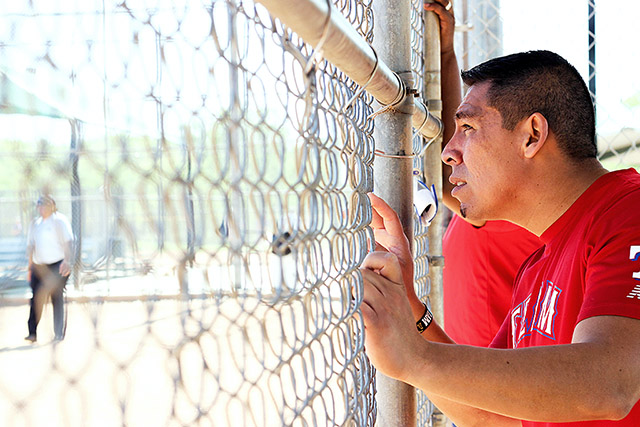LGBT Softball League Values Inclusiveness, Plays to Win

Martin Cal is one of more than 400 players in Softball Austin, the city’s first LGBT recreational softball league. Photo by Hilary Pearson/Reporting Texas
By M. Mikayla Martinez
For Reporting Texas
As the wind whipped across an Austin softball field on a Sunday morning in February, Martin Cal struggled. It was his first day on a new team, and his new boyfriend was watching from the bleachers.
But it was a better kind of nervous than how he had felt in his native Belize, where it was difficult for a gay man to fit in. “Right here,” he said, “I’m meeting … a gay community that has softball, which I like to do.”
Cal is one of more than 400 players in Softball Austin, the city’s first LGBT recreational softball league. The league gives men and women of all skill levels an opportunity to compete in an inclusive environment. There are 31 teams, the most in Softball Austin’s 11-year history.
While the city’s LGBT-friendly reputation plays a role in the league’s popularity, it has taken some time to get there.
The story began in 1998 when Ted Burton, the league’s first commissioner, wanted to play softball with his friends. He founded the Austin Bat Boys, the city’s first openly gay men’s softball team. “There was a lot more interest than we had spaces,” Burton said. “We quickly realized for all the people that wanted to come out and play ball, we couldn’t fit everybody on one team. That’s when other teams started forming, and it just grew on its own.”
In 2004, the Austin Bat Boys and other teams registered as Softball Austin under NAGAAA, the North American Gay Amateur Athletic Alliance. Registration with ASANA, the Amateur Sports Alliance of North America, followed in 2010 for the women’s division.
Since then, the league has grown at a steady average pace of one new team a season. What started as a predominantly social outlet has transformed into high-stakes competition. In the summer of 2016, Softball Austin will host the 40th NAGAAA World Series, one of the largest annual LGBT sporting events in the world.
The tournament format is similar to the Olympics, in the sense that every member-city sends its top team and one is crowned the winner, said Albert Rodriguez, commission of Softball Austin. About 60 teams and 5,000 participants are expected at the Krieg Softball Complex, the Butler Fields in Zilker Park and Southeast Metropolitan Park.
“I think it’s going to bring a great deal of cultural flair and will really reflect well on our destination as open-minded and accepting,” said Taylor Evans, account director for the Austin Sports Commission. “We haven’t done our economic impact calculation yet, but we know that Columbus, Ohio, hosting this year, is projecting an economic impact of $5 million. It should be comparable here.”
The event is just part of the appeal for friends of Austin’s gay softball community. Each player finds a different value in the league and a reason for coming back each season.
Cat Eastmond, the assistant commissioner for the women’s division, sees her experience with Softball Austin as nostalgic after playing sports as a child.
“I think a lot of people look to try to recapture that feeling in their adult life,” Eastmond said. “One of the reasons that I love playing in Softball Austin is that you get an opportunity to do that at the local and the national level.”
For others, it’s a connection beyond an athletic level stemming from a mutual understanding of the struggles of identifying as LGBT, even in a city as progressive as Austin.
Five years ago after Jersey Night, Softball Austin’s season kickoff event at a sponsor bar where everyone wears a team jersey, Emmanuel Winston and a friend were attacked downtown by four men shouting slurs about homosexuality. Winston, who was 23 and hadn’t come out, almost didn’t report the incident to the police. He said friends in the league encouraged him to speak up.
“When the news reported it, it was my coming out,” Winston said. “The support I received from Softball Austin was extremely overwhelming.”
The league’s straight players, known as “allies,” accentuate that support and sense of camaraderie. Each team is allowed a maximum of three straight players, documented by forms those players fill out at the beginning of each season, in order to thwart cheating.
“We don’t like to say ‘straight’ or ‘heterosexual,’” said Debbie Barrera, Softball Austin’s membership coordinator. “They’re just allies of the league.”
Players of Softball Austin have watched each other’s kids grow up throughout the years, and the allies and their spouses are very supportive, Barrera said.
“In the end, it doesn’t matter if it’s gay or straight,” Barrera said. “It’s just softball. It’s for the love of the game.”